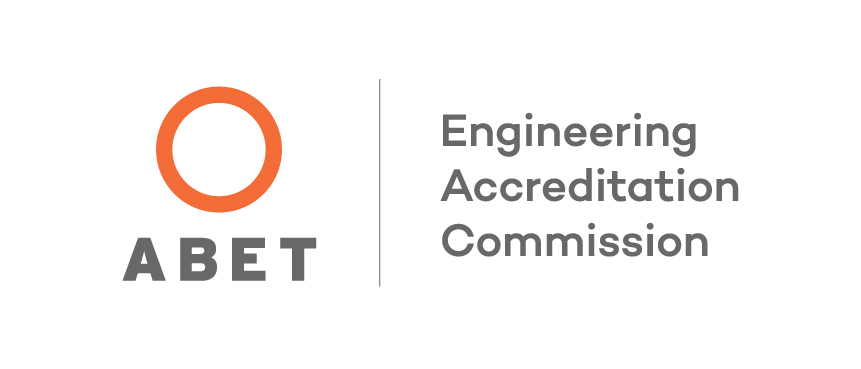Support Page Content
Accreditation & Assessment
The Bachelor of Science in Mechanical Engineering (BSME) is accredited by the Engineering Accreditation Commission (EAC) of ABET, http://www.abet.org.
Mission
The mission of the BS ME program is to provide an outstanding, practice-oriented education in mechanical engineering that will prepare graduates for professional employment and/or graduate study.
Goal
The goal of the program is to provide students with a well-rounded education based on fundamental math, science and engineering principles with an understanding of the global and societal impact of engineering decisions.
Program Educational Objectives
Program educational objectives are broad statements that describe what graduates are expected to attain within a few years of graduation.
Mechanical Engineering Graduates will have:
- utilized a foundation in engineering and science to engage in successful careers in mechanical engineering or other fields to the benefit of society.
- become effective participants or leaders in innovation and multi-disciplinary collaboration to address global technical, social, and industrial issues.
- engaged in career and professional development through self-study, continuing education, or graduate studies in engineering or other professional fields.
The objectives describe the features that are considered important in an outstanding education in Mechanical Engineering.
The program educational objectives are consistent with the University Mission, which can be summarized in the following two quotes from the University Policy Manual: "The University’s mission is guided by fundamental values which reflect its identity as a public, regional, comprehensive, metropolitan university. Thus, California State University, Sacramento seeks to offer individuals the opportunity to realize their highest aspirations and become active and involved citizens for the good of the individual and society," and "We reaffirm the value of and need for education of the whole person in the tradition of a liberal undergraduate education. Building on the fundamental knowledge and skills acquired through a general education program, the University offers traditional liberal arts disciplines and professional studies which emphasize three critical curricular values - acquisition of knowledge, the development of critical thought processes, and the synthesis of knowledge - hallmarks of an educated person."
By preparing students to "succeed in professional employment and/or graduate study in mechanical engineering," the program offers individuals the opportunity to realize their highest aspirations. By preparing students to identify, analyze, and solve practical engineering problems the program emphasizes the development of a critical thought process and by preparing students to apply knowledge of mechanics, thermodynamics, materials and manufacturing to design of mechanical engineering projects the program emphasizes the acquisition and synthesis of knowledge. Finally by preparing students to communicate effectively with their peers, other professionals, decision makers, and the general public, in the conduct of their work;" and to practice engineering in a professionally responsible and ethical manner" the program enables graduates to become active and involved citizens for the good of the individual and society.
The program educational objectives are also consistent with ABET educational criteria. The objectives provide for educating students to be able to conduct engineering work (analysis and design) in a professionally responsible and ethical manner, and to be able to communicate the results of their work to all stakeholders.
Student Learning Outcomes
The program must have documented student outcomes that support the program educational objectives. Attainment of these outcomes prepares graduates to enter the professional practice of engineering. Student outcomes are outcomes (1) through (7), plus any additional outcomes that may be articulated by the program.
- an ability to identify, formulate, and solve complex engineering problems by applying principles of engineering, science, and mathematics
- an ability to apply engineering design to produce solutions that meet specified needs with consideration of public health, safety, and welfare, as well as global, cultural, social, environmental, and economic factors
- an ability to communicate effectively with a range of audiences
- an ability to recognize ethical and professional responsibilities in engineering situations and make informed judgments, which must consider the impact of engineering solutions in global, economic, environmental, and societal contexts
- an ability to function effectively on a team whose members together provide leadership, create a collaborative and inclusive environment, establish goals, plan tasks, and meet objectives
- an ability to develop and conduct appropriate experimentation, analyze and interpret data, and use engineering judgment to draw conclusions
- an ability to acquire and apply new knowledge as needed, using appropriate learning strategies.
Enrollment and Graduation Information
The tables below show enrollment and graduation data from 2016 to 2021.
Enrollment
| Academic Year | Undergraduates Enrolled | Graduates Enrolled | Total Enrolled |
|---|---|---|---|
| 2020-2021 | 864 | 63 | 927 |
| 2019-2020 | 915 | 65 | 980 |
| 2018-2019 | 937 | 58 | 995 |
| 2017-2018 | 975 | 60 | 1035 |
| 2016-2017 | 961 | 46 | 1007 |
Degrees Conferred
| Academic Year | Bachelor's | Master's | Total Degrees Conferred |
|---|---|---|---|
| 2020-2021 | 84 | 9 | 93 |
| 2019-2020 | 203 | 22 | 225 |
| 2018-2019 | 191 | 11 | 202 |
| 2017-2018 | 205 | 18 | 223 |
| 2016-2017 | 195 | 12 | 207 |
Contact Information
If you have any questions about any of the above information, please contact Dr. Troy Topping, Chair, Department of Mechanical Engineering, at (916) 278-6624 or me@csus.edu.